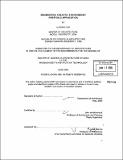Engineering creative environment portfolio application
Author(s)
Kim, IlJoong, S.M. Massachusetts Institute of Technology
DownloadFull printable version (6.707Mb)
Other Contributors
Massachusetts Institute of Technology. Dept. of Architecture.
Advisor
John de Monchaux.
Terms of use
Metadata
Show full item recordAbstract
Richard Florida's argument about creative class as the most powerful engine for economic growth of cities is validity; however, this thesis argues it is not creative class or a certain group of individuals but creative spirit that can truly contribute to city's prosperity; therefore, creating environment that can motivate the creative spirit of any socioeconomic class is the true engine for economic growth. Based on the basic premise described above, this thesis constructs a market-sensitive planning tool that can efficiently engineer creative environment. Going on step further, this thesis argues that creative economy does not derive from the number of creative people but from environment balanced with civic attributes that motivate creative spirit become creative activities. Applying portfolio theory from finance discipline to socioeconomic data about cities, this thesis suggests ways to build creative environment and further investigates potential vehicles that can facilitate the process of making creative environment which takes place as a form of efficient urban portfolios.
Description
Thesis (S.M.)--Massachusetts Institute of Technology, Dept. of Architecture, 2006. Includes bibliographical references (leaves 76-78).
Date issued
2006Department
Massachusetts Institute of Technology. Department of ArchitecturePublisher
Massachusetts Institute of Technology
Keywords
Architecture.